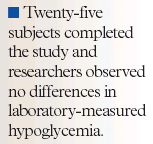- Safety & Recalls
- Regulatory Updates
- Drug Coverage
- COPD
- Cardiovascular
- Obstetrics-Gynecology & Women's Health
- Ophthalmology
- Clinical Pharmacology
- Pediatrics
- Urology
- Pharmacy
- Idiopathic Pulmonary Fibrosis
- Diabetes and Endocrinology
- Allergy, Immunology, and ENT
- Musculoskeletal/Rheumatology
- Respiratory
- Psychiatry and Behavioral Health
- Dermatology
- Oncology
New data emerge on the relationship between diabetic, pre-diabetic conditions and Alzheimer's disease
Three studies presented at the 10th International Conference on Alzheimer's Disease and Related Disorders in Madrid, Spain, yielded new data regarding the relationship between diabetic and pre-diabetic conditions and the subsequent development and treatment of Alzheimer's disease (AD).
Three studies presented at the 10th International Conference on Alzheimer's Disease and Related Disorders in Madrid, Spain, yielded new data regarding the relationship between diabetic and pre-diabetic conditions and the subsequent development and treatment of Alzheimer's disease (AD).
DEMENTIA AND GLYCEMIC CONTROL
A study of 22,852 individuals from the Kaiser Permanente of Northern California Diabetes Registry with type 2 diabetes suggested a graded association between higher hemoglobin A1c (HbA1c) levels and the risk of dementia.
Using Cox proportional hazard models adjusted for age, education, race, sex, body mass index, diabetes duration, diabetes treatment, and cardiovascular disease, researchers identified 2,488 individuals in the study population (11%) with dementia. HbA1c was associated with a continuous hazard ratio (HR) of 1.03 (95% CI, 1.01–1.05).
Participants with higher HbA1c levels demonstrated a greater likelihood of dementia. Compared with those who had an HbA1c level <10 (n=19,316), those with HbA1c levels between 10 and 11.9 (n=2,286) were 16% more likely to have dementia (HR=1.16; 95% CI, 1.01–1.32). Those with HbA1c levels between 12 and 14.9 (n=1,143) were 25% more likely to have dementia (HR=1.25; 95% CI, 1.03–1.53), and those with HbA1c levels >15 (n=105) were 83% more likely to have dementia (HR=1.83; 95% CI, 1.01–3.65).
The study authors suggested a threshold HbA1c of 9.9%, but said that further studies are necessary to confirm that HbA1c-lowering interventions lead to lower risks of dementia.
TZD AND ALZHEIMER'S DISEASE
A retrospective follow-up study of 142,328 veterans with diabetes who were receiving care from the United States Veterans Administration (VA) demonstrated that the use of thiazolidinediones (TZDs) by patients was associated with a reduced risk of AD.

Researchers used Cox proportional hazard regression to estimate the risk of AD in both groups and adjusted for factors such as demographics, other diabetes medications, other comorbidities, use of antihypertensive and lipid-lowering medications, serum lipids, body mass index, and a summary of glycemic control based on multiple HbA1c measures.
TZD initiators demonstrated lower rates of AD regardless of subsequent use of insulin or other diabetes medications (adjusted HR=0.80; 95% CI, 0.69–0.95). Using broader diagnostic codes to define AD yielded a similar result (HR=0.76; 95% CI, 0.68–0.85). A parallel analysis comparing those who initiated TZD with those who initiated metformin yielded a hazard ratio of 0.92 (95% CI, 0.78–1.09).
PGZ SAFETY
The TZD pioglitazone (PGZ), which is approved to treat type 2 diabetes, was well tolerated by patients in the treatment of AD in a small, randomized, double-blind, placebo-controlled pilot study.
Twenty-nine nondiabetic subjects (mean age 70.9 years) with mean Mini-Mental State exam scores of 21.0 received treatment over 18 months and met the National Institute of Neurological and Communicative Disorders and Stroke-Alzheimer's Disease and Related Disorders Association (NINCDS-ADRDA) criteria for probable AD. Researchers randomly assigned subjects to PGZ 45 mg daily (n=14) or to placebo (n=15) and recorded safety and efficacy measures quarterly. Subjects were provided with 200 units of vitamin E daily, remained on stable doses of cholinesterase inhibitors, and were permitted memantine therapy as it became available.
Twenty-five subjects completed the study (12 in the PGZ group and 13 in the placebo group), and the researchers observed no differences in laboratory-measured hypoglycemia (28.6% in the PGZ group and 26.7% in the placebo group). No statistically significant differences were observed in cognition, function, or behavior measures, which researchers expected due to the small sample size. An effect size of 3.5 age-adjusted Alzheimer's Disease Assessment Scale cognitive subscale (ADAS-cog) points at 12 months was observed.
The primary clinically significant adverse effect was edema, which occurred more often in the PGZ group than in the placebo group (28.6% vs 0%, respectively), and was consistent with the known effects of PGZ.
SOURCE Whitmer RA, Selby JV, Van Den Eeden SK, Haan MN, Quesenberry Jr CP Minkoff J, Yaffe K. Glycemic control and risk of dementia in a cohort of patients with type 2 diabetes [abstract]. Paper presented at: International Conference on Alzheimer's Disease and Related Disorders; July 16, 2006; Madrid, Spain. Available at: http:// http://abstractsonline.com/. Accessed August 15, 2006.
FINANCIAL DISCLOSURES: The authors reported no financial disclosures in this study.
SOURCE Miller DR, Fincke BG, Davidson JE, Weil JG. Thiazolidinedione use may forestall progression of Alzheimer's disease in diabetes patients [abstract]. Paper presented at: 10th International Conference on Alzheimer's Disease and Related Disorders; July 16, 2006; Madrid, Spain. Available at: http:// http://abstractsonline.com/. Accessed August 15, 2006.
FINANCIAL DISCLOSURES: DR Miller received research support from Glaxo International. BG Fincke reported no financial disclosures. JE Davidson is an employee of GlaxoSmithKline. JG Weil is an employee of GlaxoSmithKline.
SOURCE Geldmacher DS, Fritsch T, McClendon MJ, Lerner AJ, Landreth GE. A double-blind, placebo-controlled, 18-month pilot study of the PPAR-gamma agonist pioglitazone in Alzheimer's disease [abstract]. Paper presented at: International Conference on Alzheimer's Disease and Related Disorders; July 17, 2006; Madrid, Spain. Available at: http:// http://abstractsonline.com/. Accessed August 15, 2006.
FINANCIAL DISCLOSURES: DS Geldmacher is a consultant for Takeda Pharmaceuticals and received research support from Takeda. T Fritsch reported no financial disclosures. MJ McClendon reported no financial disclosures. AJ Lerner reported no financial disclosures. GE Landreth has served as a consultant for Takeda and has a financial interest in a Case Western Reserve University patent for the use of pioglitazone in AD.
